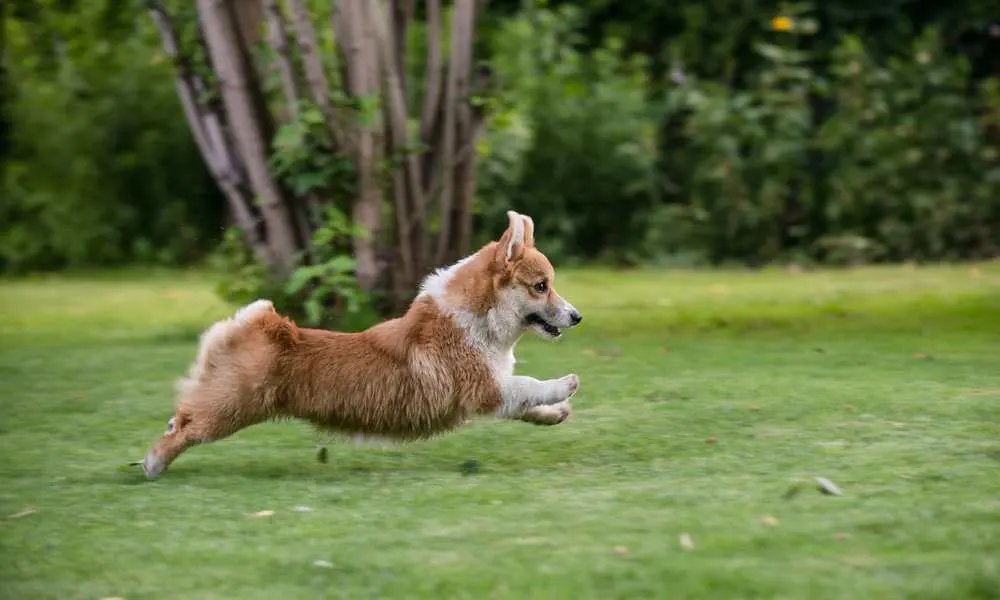Some people like to brag about how they own a fast dog, some people like to brag how they own a cute dog, and some people like to brag how they own an intelligent dog.
Well, corgi owners can brag that they own a dog that has all of those traits. In today’s article, we’ll be concentrating on corgi’s speed. Something a lot of owners or future owners would like to know.

How Fast Are Corgis?
Corgis can reach speeds up to 25 miles per hour which is not too shabby. There are faster dog breeds out there, but corgis are certainly no slouches. We’ve created a table as a direct comparison between some of the faster and some of the slower dog breeds out there.
| Breed | Speed |
|---|---|
| Greyhound | 45 mph |
| Saluki | 42 mph |
| Afghan Hound | 40 mph |
| Vizsla | 40 mph |
| Dalmatian | 37 mph |
| Borzoi | 35 mph |
| German Shepherd | 30 mph |
| Jack Russell Terrier | 30 mph |
| Border Collie | 30 mph |
| Corgi | 25 mph |
| French Bulldog | 17mph |
| Chihuahua | 15mph |
| Bassett Hound | 5-10 mph |
How Can Dogs Run So Fast?
More or less, all dogs share a complex skeletal system where the spine is able to contract and expand during running. This helps dogs maximize the efficiency of their run.
An animal that is similar in skeletal biology is a cheetah. Cheetahs are considered to be the fastest land animal on the planet, reaching speeds of 70 mph.
Dogs that are fast tend to resemble cheetahs when it comes to the length and strength of the legs that support their robust frame and enable them to reach those amazing speeds.
Adding to that, dogs, unlike us, don’t have a collarbone which means their shoulder bones are disconnected, allowing for better flexibility during running. Also, fast dogs have aerodynamic head shapes that help them with wind resistance and with breathing in the proper amount of air.
On the other hand, dogs that don’t have long legs and whose faces are short are often much slower compared to their long-legged counterparts. But something similar goes for breeds that are big and tall, but just don’t have the speed—something like a Saint Bernard, for example.
What About Corgis?
In some way, corgis defy logic. They’re short-legged and stout, and the fact they’re able to reach speeds of 25 mph is quite extraordinary.
They might not have a head as aerodynamic as that of a greyhound, but they’re certainly not flat-faced as a Pug or a French bulldog. This means that they’re able to breathe in enough air for them to withstand longer sprints without getting particularly tired.
Their adequate head size doesn’t compensate for their short legs, so what does? One logical explanation would be that they’re just “strong.”
They’re able to exert a necessary amount of force through their bodies that would allow them to be fast despite some other biological obstacles.
After all, corgis were specifically bred for herding cattle. Their lives consisted of running around, herding, and dodging animals ten times their size. Slow dogs wouldn’t make for particularly good herders.

How Often Should Your Corgi Run?
This is a good question that requires several things to be taken into consideration.
The Climate
Corgis have a very thick double coat. The outer layer acts as a water and dirt repellent, and the inner layer is their insulation. Corgis have two coats because of the region they’ve originated in, known by the name of Wales; you’ve probably heard of it.
Wales has an oceanic climate. The temperatures are cool, and there’s quite a bit of humidity and rain. Corgis are able to deal with that climate without any issues due to the coat that we previously mentioned.
They can run around as much as they want without much trouble. However, if a corgi is living in a tropical climate, rules tend to change.
Mainly, their coat can become a huge hindrance. Due to their doable coated nature, corgis can overheat very easily if the temperatures outside are too hot. This is why we recommend that during summers, you keep your corgi indoors and keep him cool and cozy.
As for exercising, wait for the temperatures to go down, so either in the evening or very early morning.
Learn More: What Is The Best Climate For Corgis?
Their Health
Another thing to take into consideration before letting your corgi run around is their health. Does your corgi have any health issues?
Corgis can suffer from joint and hip problems, and if that’s the case, overexertion during running can make the situation even worse. That’s why we recommend talking to your corgi’s veterinarian before starting any serious exercise regimen.
Don’t Immediately Go All In
This somewhat ties into our previous point.
Just like you wouldn’t wake up one day and go run a 10k, the same goes for your corgi. If you know your corgi is healthy and you got a green light from the vet, go ahead, start, but start small.
You can’t turn a couch potato into a racing dog in just one day or even a week. If you’re wondering what kind of exercises are suitable for your corgi, we’ll give you a few ideas.

Corgi Running Exercises
Let’s take a look at some of our favorite running exercises for corgis.
Before we start, though, we want to point out the fact that just like us, corgis can do with a bit of warm-up before doing any kind of high exertion exercise.
A quick walk before any of the exercises we’re about to list is highly necessary. Also, if your corgi is running a lot, make sure their diet is suited to support that kind of strenuous activity.
1. Jogging Partner
Corgis can be a lot of work sometimes. Corgi owners often don’t have enough hours in the day to devote time both to themselves and to their dogs.
If you’re one of those people that can’t find enough time to do everything, there’s a way for you to stay fit and to ensure your corgi gets enough exercise.
Jogging is something we highly recommend, especially to younger owners and younger corgis. The exercise is a great way to get some cardio in and let your corgi spend some much-needed time outside. Before setting out on this jogging journey, we recommend you buy a hands-free leash as it will make your life that much easier.
2. Fetch
The timeless classic – fetch.
If you’re not in the mood to jog around with your corgi but you still want your pet to get some exercise, fetch is the way to go. Since corgis are quite energetic, we recommend doing a quick before and after fetch walk.
The first one is the warm-up we recommended, and the second one is to properly tire out the little fur-ball, so they don’t have that much left in the tank.
If your corgi isn’t that motivated to play fetch with you, we recommend incorporating a clever “bribe” system. Give them a treat or pet them a few times when they fetch the ball. Do it in moderation though; you don’t want your corgi getting fat.
3. Herding Ball
The last “exercise” we recommend is the herding ball.
A herding ball is a ball that’s made to be indestructible, it can’t be carried around, it doesn’t bounce, and is somewhat heavy. Corgis love to push this ball around and chase it. After all, they are herders by nature.
The herding ball doesn’t include nearly as much running as the previous two exercises, but neither does it require much participation from the owner. Also, corgis tend to put so much energy into playing with this thing that they often get a good enough workout from it.
Two things to keep in mind:
- Corgis like to bark when they herd, if you don’t want to piss off your neighbors, this might not be the best option.
- If you have a yard full of flowers, you might regret buying this thing since your corgi won’t care that much about vegetation when it starts playing. So if flowers are your concern, monitor your corgi’s playtime with the herding ball to make sure nothing bad happens.

Pros (And Con) Of Running
So far, we might have made running look like a bad thing for your corgi; that wasn’t our intention.
Running is great; if there aren’t any health issues stopping your corgi from running, we think you should make it happen as often as possible.
Here are some of the biggest pros of running. We’ll also provide you with a con that, just for the sake of staying objective.
Energy Expenditure
As we mentioned, corgis are powerhouses of energy. They were bred to withstand 16 hour days without stopping to rest. This was great during their herding days a few hundred years ago.
Now, however, it can be a big problem, especially for owners who don’t have time or backyards. Luckily, we’ve given you some of the exercises you can incorporate to make sure your corgi spends its excess energy properly.
Running should tire them out just enough to keep them out of trouble. Bored corgi can be a dangerous thing to pillows and couches.
Weight Maintenance
A sedentary lifestyle doesn’t suit us, but it certainly doesn’t suit our dogs either.
Overweight corgis are at some serious health risks. If your corgi is overweight, we don’t recommend you start with running, but with regular walks and a complete diet overhaul.
After a while, when your pet’s weight has gone down enough, you can start giving it more serious exercises to keep the pooch fit and healthy.
Bonding
Finally, we like to mention bonding.
This is for those who chose the jogging or fetch exercises we listed earlier. Corgis are social beings; they adore spending time with their owners.
Start spending quality time together every day. You won’t just keep your corgi physically healthy but mentally healthy as well. This will undoubtedly prolong your dog’s life and the time you’ll spend together.
Hard On Joints
This is that one con we have to mention. Running can be very hard on joints.
That’s why we don’t recommend it for overweight corgis or overweight dogs in general. The amount of force that goes through the skeleton during running can seriously hurt a dog that isn’t able to withstand it. But don’t worry, we’ll give you an excellent alternative to running.

Alternative To Running
If your corgi has any joint issues. The best alternative to running is swimming. If your dog is a fan of water, swimming is a superb all-around exercise.
It develops all the major muscle groups and keeps your dog healthy and happy. Vets tend to recommend swimming as an excellent rehabilitation exercise for any dog suffering from bone conditions.
Learn More: Why Do Corgis Float In Water? My Floating Corgi

Conclusion
If you’re a corgi owner, now you know how fast your dog can actually run.
The fact that it’s capable of it despite some of the biological obstacles makes the corgi breed even more special.
Running is great and you should let your corgi run as often as possible, just keep in mind all of the points we’ve mentioned in today’s article. You don’t want your corgi getting hurt.

